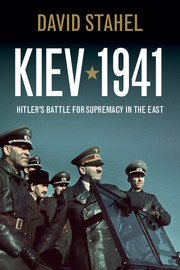Book contents
- Frontmatter
- Contents
- Figures
- Tables
- Maps
- Acknowledgements
- Glossary of terms
- Tables of military ranks and army structures
- Introduction
- 1 The bulldog, the eagle and the bear
- 2 Germany's defeat in the east
- 3 The road to Kiev
- 4 War in the Ukraine
- 5 Ominous horizons
- 6 The battle of Kiev
- 7 Slaughter in the Ukraine
- 8 Visions of victory
- 9 The calm before the storm
- 10 Moscow in the crosshairs
- Conclusion
- Notes
- Bibliography
- Index
10 - Moscow in the crosshairs
Published online by Cambridge University Press: 05 November 2011
- Frontmatter
- Contents
- Figures
- Tables
- Maps
- Acknowledgements
- Glossary of terms
- Tables of military ranks and army structures
- Introduction
- 1 The bulldog, the eagle and the bear
- 2 Germany's defeat in the east
- 3 The road to Kiev
- 4 War in the Ukraine
- 5 Ominous horizons
- 6 The battle of Kiev
- 7 Slaughter in the Ukraine
- 8 Visions of victory
- 9 The calm before the storm
- 10 Moscow in the crosshairs
- Conclusion
- Notes
- Bibliography
- Index
Summary
Throwing caution to the wind – the Typhoon swells
As the days counted down to Bock's final offensive, spirits among the German soldiers were generally high. The men of the Ostheer had been left in no doubt about the scale of the German victory in the Ukraine, nor the tenuous state of the Red Army. Not surprisingly hopes were renewed that the war might indeed be ended in 1941 and many expressed the belief that, however bad the situation might appear in their own units, on the whole the German army was still strong and it was the Soviets who were having to stave off defeat. Yet if there was one aspect of Russian history that every German soldier knew, it was the fate that had befallen Napoleon's invading army in 1812. Indeed the French Emperor had already conquered Moscow in September and by the middle of October was withdrawing from Russia, heading back to his supply centres, when his army was so utterly ruined. Bock, by contrast, would be heading further east and further away from his supply centres. The fabled spectre of campaigning through a Russian winter thus assumed a certain foreboding prominence, which loomed in the minds of many Landsers as the weather began to change. Solomon Perel, who was travelling with a group of soldiers from the 12th Panzer Division, noted that the men ‘had not forgotten Napoleon's defeat in 1812 and…[t]hey were scared out of their wits’. Another soldier wrote home on 21 September, ‘God save us from a winter campaign in the east. It is very cold here already and rains practically every day.’ Wilhelm Prüller wrote in his diary on 28 September that it was so cold he and his comrades had to sleep in their vehicles. He then continued, ‘Terribly cold. You can't wrap yourself in too many blankets. When I think back on the July and August days, when we simply spent the nights lying in a field on the grass, I have to mourn for the summer…And who knows what's in front of us as far as the weather goes?’ It was a prudent question, which held dire implications not only for the operational aspects of the campaign, but also for the war of annihilation. With a chronic shortage of housing in the forward areas of the front, German soldiers ensured they were not the ones being left out in the cold. As Wilhelm Prüller's diary records:
You should see the act the civilians put on when we make it clear to them that we intend to use their sties to sleep in. A weeping and yelling begins, as if their throats were being cut, until we chuck them out. Whether young or old, man or wife, they stand in their rags and tatters on the doorstep and can't be persuaded to go…When we finally threaten them at pistol point, they disappear for a few minutes, only to return again yelling even more loudly.
While no one was freezing to death in September 1941, the Russian peasants knew better than anyone what was coming and knew that survival depended on shelter and stores of food for the coming winter. Without access to these the weather would soon prove fatal for countless Soviet peasants. In this indirect way Germany's war of annihilation involved average German soldiers to a far greater extent than is often acknowledged. Between seventeen and eighteen million Soviet civilians died in the war with Nazi Germany and most of these died not as a direct result of a German action (that is, by being shot), but rather from the conditions created by the German army and occupation forces (starvation, disease, exposure, overwork, etc.). Accordingly, however some historians may seek to ‘interpret’ the circumstances or apply restrictive definitions to what constituted a war crime, the fact remains that the Ostheer and its soldiers, each to varying extents, participated in and contributed to the conditions which resulted in the deaths of so many. In this sense one must keep in mind that the well-known suffering of the German army during the winter fighting had even worse results for the civilian population, especially in the areas of heavy German troop concentrations.
- Type
- Chapter
- Information
- Kiev 1941Hitler's Battle for Supremacy in the East, pp. 332 - 344Publisher: Cambridge University PressPrint publication year: 2011



